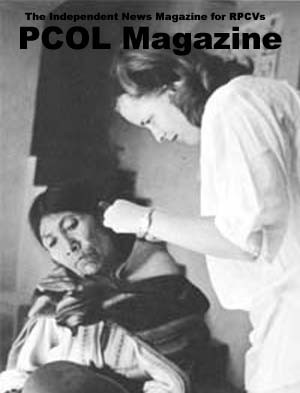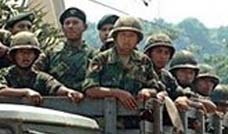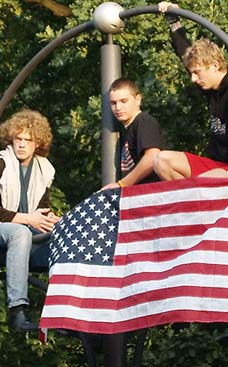2008.09.30: September 30, 2008: Headlines: Application Process: The Northern Light: Generally, Three Common misconceptions cloud peoples' views of the Peace Corps
Peace Corps Online:
Peace Corps News:
Peace Corps Library:
Application Process:
2008.09.30: September 30, 2008: Headlines: Application Process: The Northern Light: Generally, Three Common misconceptions cloud peoples' views of the Peace Corps
Romania RPCV Melissa Lawent says There are Three Common misconceptions That Cloud peoples' views of the Peace Corps

It is vital for recruiters to fully inform interested volunteers on joining the Peace Corps. Generally, three misconceptions cloud peoples' views of the Peace Corps. First, she negated the idea that the Peace Corps is a reason to travel the world; "it is in fact an experience, not a vacation," Lawent stated. It is a professional organization in which skilled volunteers travel abroad to make use of their talents in Peace Corps' specialized programs. Second, many believe that "volunteers are in some way sort of 'Americanizing' the nations that it aids," Lawent noted. This, however, is not the case. When a volunteer takes part in his or her service, he or she must learn to adapt within the culture by learning the local language and by assimilating into the local culture and living as the people do. Volunteers by no means push their own culture and beliefs upon those they help. If anything, volunteers learn more about their host country's culture than that country learns about our culture. Third, "We are a volunteer organization. People think you can work in any skill," Lawent commented. This is not true. Volunteers are chosen based on the skill set that they have prior to their involvement in Peace Corps. They are chosen based on their experience and/or degree.
Romania RPCV Melissa Lawent says There are Three Common misconceptions That Cloud peoples' views of the Peace Corps
Tips for interested Peace Corps applicants revealed
Kaitlynn Jackson
Issue date: 9/30/08 Section: Features
On September 24 and 25, the Peace Corps' regional recruiter from Seattle, Melissa Lawent, was on campus raising awareness about the organization and providing information on recruitment. Lawent spoke both on campus and at the Loussac Library, where she spoke about her personal experience as a former volunteer as well as the misconceptions about the organization and its lengthy application process.
It is vital for recruiters to fully inform interested volunteers on joining the Peace Corps. Generally, many misconceptions cloud peoples' views of the Peace Corps. Lawent listed the three most common misconceptions of the Peace Corps. Firstly, she negated the idea that the Peace Corps is a reason to travel the world; "it is in fact an experience, not a vacation," Lawent stated. It is a professional organization in which skilled volunteers travel abroad to make use of their talents in Peace Corps' specialized programs.
Secondly, many believe that "volunteers are in some way sort of 'Americanizing' the nations that it aids," Lawent noted. This, however, is not the case. When a volunteer takes part in his or her service, he or she must learn to adapt within the culture by learning the local language and by assimilating into the local culture and living as the people do. Volunteers by no means push their own culture and beliefs upon those they help. If anything, volunteers learn more about their host country's culture than that country learns about our culture.
"We are a volunteer organization. People think you can work in any skill," Lawent commented. This is not true. Volunteers are chosen based on the skill set that they have prior to their involvement in Peace Corps. They are chosen based on their experience and/or degree.
The application process is quite a lengthy process and probably the most difficult part of becoming a volunteer. First, an application must be submitted and if relevant experience and areas of study are adequate, an interview with a recruiter is then scheduled. From there, volunteers are nominated to a program, and then take part in a lengthy medical and legal review. This makes up the majority of the process. Follow-ups on medical and law issues are dealt with, and once completed, the Peace Corps formally invites the volunteer to the program. From there, all that is left is preparation for departure.
One in three volunteer applicants are accepted, however this number includes students who select-out for their own personal reasons. The typical reasons why a volunteer would not be accepted include: inadequate experience or economic/medical reasons. Because the Peace Corps' mission is to aid other nations, providing volunteers with adequate work and volunteer experience is vital. In many cases, the Peace Corps will give applicants more time to gain that work and volunteer experience before reapplying.
Lawent suggested that any student who plans to join the Peace Corps after college graduation should submit his or her application during his or her junior year, because the application process takes approximately a year to complete. Future volunteers should first do their homework and research Peace Corps by browsing the detailed website, attending local events, and talking to a former volunteers. By doing so, future volunteers can obtain insight into the program and decide which program is right for them. By volunteering in the Anchorage community and obtaining work experience in a relevant field, students can prepare for the application process.
When asked about the experience, skills, and knowledge the ideal applicant must have, Lawent stated that he or she must be flexible about their geographical preference and assignment area, have both a sense of theory and hands-on experience, and also have a sense of adventure and a willingness to learn about other cultures. "For applicants that are thinking about Peace Corps, what I always stress is be flexible about where it is that you're willing to serve, because typically the reality is you may serve in a part of the world that you have very little experience or knowledge of," Lawent said.
Regarding service, the Peace Corps only serves in areas of the world where help is requested, and anytime when they are asked to leave, the country's request is granted. The mission of the Peace Corps service is to share the American perspective, but to not convert nations to the "American" ways. Individual volunteer service lasts for 27 months and provides volunteers with not only a way to see various regions of the world but also provides a sense of culture to all involved.
Lawent is a former volunteer who spent 2003 to 2005 in Romania, where she worked at an after school center and taught grades K-4 English as well as bilingual high school students. She aided these high school students in preparing for their Cambridge exams, which those students could then use to show universities and employers in their future. She spoke of her service with enthusiasm and discussed the many things she learned and people she met while overseas.
Needless to say, with an organization as large and involved as the Peace Corps, there is much to learn. Interested students can visit the Peace Corps website at www.peacecorps.gov and keep an eye out for local events in Anchorage.
Links to Related Topics (Tags):
Headlines: September, 2008; Application Process; Recruitment; Peace Corps Romania; Directory of Romania RPCVs; Messages and Announcements for Romania RPCVs
When this story was posted in September 2008, this was on the front page of PCOL:
Peace Corps Online The Independent News Forum serving Returned Peace Corps Volunteers 
 | Peace Corps Suspends Program in Bolivia
Turmoil began in Bolivia three weeks ago sparked by President Evo Morales' pledge to redistribute wealth from the east to the country's poorer highlands. Peace Corps has withdrawn all volunteers from the country because of "growing instability." Morales has thrown out US Ambassador Philip Goldberg accusing the American government of inciting the violence. This is not the first controversy surrounding Goldberg's tenure as US ambassador to Bolivia. |








Read the stories and leave your comments.

Some postings on Peace Corps Online are provided to the individual members of this group without permission of the copyright owner for the non-profit purposes of criticism, comment, education, scholarship, and research under the "Fair Use" provisions of U.S. Government copyright laws and they may not be distributed further without permission of the copyright owner. Peace Corps Online does not vouch for the accuracy of the content of the postings, which is the sole responsibility of the copyright holder.
Story Source: The Northern Light
This story has been posted in the following forums: : Headlines; Application Process; Recruitment; COS - Romania
PCOL42222
13
I read with interest the article by Melissa Lawent (regarding requirements for acceptance in the Peace Corps). It pointed out the very substantial differences between current standards and the standards used when I was accepted and served (Panama 1964-1966).
The article was of interest because it is clear that I would not have been accepted as a volunteer had these standards been in effect at the time (age 19; no degree; less than two years at a community college; no second language ability).
I simply filled out a form, took a test at the local post office, and then received a letter telling me to report for training.
Another difference between the Melissa Lawent article and the reality I found in training was the "selecting out" process (volunteers were generally unaware of this process until they were informed during training). This process came as a complete surprise to many who were "selected out" after leaving jobs, selling houses, etc.)
When I learned of this process during training, I was convinced that I would be "selected out", but, for some unknown reason, I was not.
I'm sure that objective studies and experience with younger, less "qualified" volunteers justifies the current standards. However, I believe the existing process may undermine, to some extent, the vision and goals of John Kennedy when he gave birth to the organization.
Like most RPCV's, Peace Corps service was critical in fulfilling my goals in life. I believe I succeeded as a volunteer, and I am certain than the Peace Corps gave me much more than I could ever give back.
Gary D. Admire
Chief Federal Admin Law Judge (ret)
Homicide Prosecutor (ret)
Director USAID Project to Restucture Salvadoran Justice System (ret)
Lecturer, Criminal Law and Procedure
I am not sure my comments meet the criteria expected, but I proceed:
I served in Samoa (then Western Samoa) during 1991/93 for more than 18 months. I was an accountant and applied for Peace Corps 12 months before I retired. After 18 months I left having experienced a very rewarding experience there with the Samoan people and with teaching accounting at my school. I felt a big language handicap, although we were expected to teach and speak English, so the Samoan girls would do the same. But I had a miserable experience with the Peace Corps organization and the two young women with whom I was assigned to share a small house.
My first roommate was a recent college graduate in her second year in Samoa. I later learned she had been asked to leave her former residence at a nearby Catholic Boy's College (high school) for secretly moving her male Samoan lover into the quarters in violation of the rules. She was then assigned to share with me a tiny house on the Catholic girls St. Mary's College compound, where she also (secretly) arrived with the lover. Really not the atmosphere I anticipated when joining the Peace Corps. But Samoa had a major hurricane two weeks after my Group 49 arrived, with roofs off schools, roads wrecked, school opening delayed, and it seemed no time to be picky. The couple took over the small kitchen each evening, and moved the mattress from the living area couch into her bedroom to the floor on Sunday afternoons for their nap.
One Saturday she put pesticides in her bedroom to kill insects and left for the weekend without prior notice to me. This is the sort of product for which they put a tent over a house and treat the entire inside of the tent. I was outside on the porch when she left and we chatted, but she did not mention it. I then walked around outside for some time and did not discover the situation until the fumes had thoroughly permeated the house and surroundings. The rooms were separated only by a head-high partition. I became extremely sick, from which I still have never fully recovered. I have Multiple Chemical Sensitivity, now diagnosed by three different doctors, and clearly have scarring of my inside throat. One of the Nuns at the school arrived on the compound late on that Saturday afternoon (all were off campus at a big wedding) and I asked her to come down and inspect the small house. At that time the terrible odor was still detectable at least 300 feet away, and I was sitting an unlocked classroom to escape it. The principal came down late that night when she returned and said "if I was insistent she would let me sleep up in their quarters that night". I chose not to be insistent. My respiratory system was severely damaged. I went for respiratory medical treatment the following Monday morning and reported the incident to our nurse but the roommate denied it. A week later I was sent to Honolulu for medical treatment (for two weeks in September 1992). I have never completely recovered to this day. My report of the chemical exposure was downplayed by all concerned, including some medical person who called me in Honolulu from the Washington PC office. The Peace Corps did not commit to returning me to Samoa until the last few days, but I was glad to return and was allowed to do so. When I left the Peace Corps I was denied medical treatment for the respiratory problem. I asked for my medical records and was denied access to them as they were 'confidential'.
My first roommate's tour finally ended, and clearly she got into some problem at that time. Unexpectedly I was asked to meet with the Principal of our school, St. Mary's College and when I arrived the roommate was there as well. Obviously she had complained that I was the cause of whatever problem she was facing with the Peace Corps and school. The Catholic Sister/Principal asked if I had any comment, and I had none (the lover was the nephew of our Principal, and I felt it unacceptable to complain - family is ALL IMPORTANT in Samoa). I breathed a sigh of relief when she left the island - but when the new roommate arrived on island she arrived in our house with an 'attitude' - piled her garbage in the kitchen, then on the front porch. We were in the tropics and she was a heavy meat eater (one can imagine the smells)and refused to take the garbage up to the road as was expected. I have no doubt the departing one had filled her with stories about me before she left the island.
The Peace Corps nurse (A Samoan) did all she could to improve my situation but to no avail. She recommended I see an American Councilor on island, which I did. The only advice the councilor could give me was to fight, fight! Need I say that I did not join the Peace Corps to be a fighter? The PC Director then offered to send me to another school and since I had 15 months seniority at St. Mary's I flatly turned down the offer. His reason for not moving the second newly-arrived roommate instead was that she was a volunteer! Peace Corps friends later told me that she left the Island not long after I did. The last two months I was in Samoa I stayed with a civilian couple on island rather than on the school Compound. This was arranged by a friend whose husband was with the World Health Organization.
For 18 months drinking parties occurred almost all weekends, many at the PC Director's house, to the dismay and non-participation of some of us. My older Peace Corps friends all lived alone at their compounds, mostly on the island of Savai'i and held themselves apart from the sort of things I lived with daily. It actually took me many years to finally admit to myself that joining the Peace Corps was a huge mistake; In retrospect I cannot say my failure to decline the living conditions in the beginning were a mistake - there was that hurricane! I recall getting a letter (which I still have) during that year of preparation, stating that older volunteers might no feel quite a part of the system. Right on! My experience - physically, financially, and especially emotionally - was a disaster and one of the great disappointments of my life.













